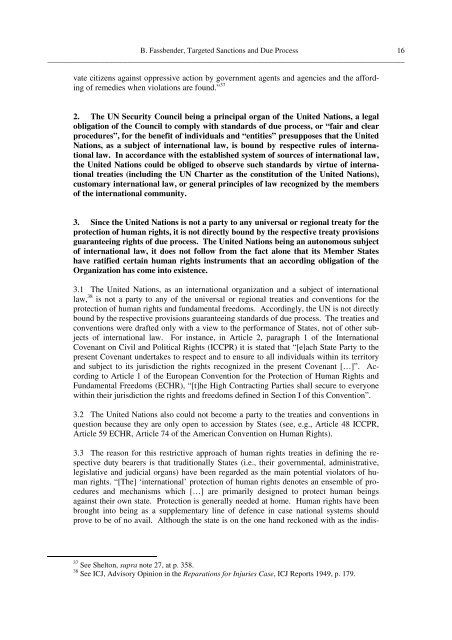Targeted Sanctions and Due Process - United Nations Treaty ...
Targeted Sanctions and Due Process - United Nations Treaty ...
Targeted Sanctions and Due Process - United Nations Treaty ...
You also want an ePaper? Increase the reach of your titles
YUMPU automatically turns print PDFs into web optimized ePapers that Google loves.
B. Fassbender, <strong>Targeted</strong> <strong>Sanctions</strong> <strong>and</strong> <strong>Due</strong> <strong>Process</strong><br />
16<br />
______________________________________________________________________________________________<br />
vate citizens against oppressive action by government agents <strong>and</strong> agencies <strong>and</strong> the affording<br />
of remedies when violations are found.” 37<br />
2. The UN Security Council being a principal organ of the <strong>United</strong> <strong>Nations</strong>, a legal<br />
obligation of the Council to comply with st<strong>and</strong>ards of due process, or “fair <strong>and</strong> clear<br />
procedures”, for the benefit of individuals <strong>and</strong> “entities” presupposes that the <strong>United</strong><br />
<strong>Nations</strong>, as a subject of international law, is bound by respective rules of international<br />
law. In accordance with the established system of sources of international law,<br />
the <strong>United</strong> <strong>Nations</strong> could be obliged to observe such st<strong>and</strong>ards by virtue of international<br />
treaties (including the UN Charter as the constitution of the <strong>United</strong> <strong>Nations</strong>),<br />
customary international law, or general principles of law recognized by the members<br />
of the international community.<br />
3. Since the <strong>United</strong> <strong>Nations</strong> is not a party to any universal or regional treaty for the<br />
protection of human rights, it is not directly bound by the respective treaty provisions<br />
guaranteeing rights of due process. The <strong>United</strong> <strong>Nations</strong> being an autonomous subject<br />
of international law, it does not follow from the fact alone that its Member States<br />
have ratified certain human rights instruments that an according obligation of the<br />
Organization has come into existence.<br />
3.1 The <strong>United</strong> <strong>Nations</strong>, as an international organization <strong>and</strong> a subject of international<br />
law, 38 is not a party to any of the universal or regional treaties <strong>and</strong> conventions for the<br />
protection of human rights <strong>and</strong> fundamental freedoms. Accordingly, the UN is not directly<br />
bound by the respective provisions guaranteeing st<strong>and</strong>ards of due process. The treaties <strong>and</strong><br />
conventions were drafted only with a view to the performance of States, not of other subjects<br />
of international law. For instance, in Article 2, paragraph 1 of the International<br />
Covenant on Civil <strong>and</strong> Political Rights (ICCPR) it is stated that “[e]ach State Party to the<br />
present Covenant undertakes to respect <strong>and</strong> to ensure to all individuals within its territory<br />
<strong>and</strong> subject to its jurisdiction the rights recognized in the present Covenant […]”. According<br />
to Article 1 of the European Convention for the Protection of Human Rights <strong>and</strong><br />
Fundamental Freedoms (ECHR), “[t]he High Contracting Parties shall secure to everyone<br />
within their jurisdiction the rights <strong>and</strong> freedoms defined in Section I of this Convention”.<br />
3.2 The <strong>United</strong> <strong>Nations</strong> also could not become a party to the treaties <strong>and</strong> conventions in<br />
question because they are only open to accession by States (see, e.g., Article 48 ICCPR,<br />
Article 59 ECHR, Article 74 of the American Convention on Human Rights).<br />
3.3 The reason for this restrictive approach of human rights treaties in defining the respective<br />
duty bearers is that traditionally States (i.e., their governmental, administrative,<br />
legislative <strong>and</strong> judicial organs) have been regarded as the main potential violators of human<br />
rights. “[The] ‘international’ protection of human rights denotes an ensemble of procedures<br />
<strong>and</strong> mechanisms which […] are primarily designed to protect human beings<br />
against their own state. Protection is generally needed at home. Human rights have been<br />
brought into being as a supplementary line of defence in case national systems should<br />
prove to be of no avail. Although the state is on the one h<strong>and</strong> reckoned with as the indis-<br />
37 See Shelton, supra note 27, at p. 358.<br />
38 See ICJ, Advisory Opinion in the Reparations for Injuries Case, ICJ Reports 1949, p. 179.
















